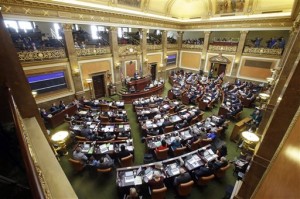Human traffickers might face Utah’s death row if lawmakers pass a bill that will impose the death penalty in aggravated crimes.

Rep. Paul Ray, R-Clearfield, introduced the bill to a legislative committee Feb. 2 by recounting the case of Shelby Andrews, who was brutally beaten to death by her stepmother and father. Andrews’ parents were unable to receive a death penalty because the law did not permit their crime to be punishable by death.
“(The parents) could not receive the death penalty because the intent for murder wasn’t there,” Ray explained. “Their intent was for abuse.”
HB136 was written to protect children from human trafficking, but now HB136 protects every victim from aggravated crimes that come from human trafficking.
This bill will impose the death penalty on human traffickers if they knowingly cause the death of another through aggravated robbery, rape or assault.
Representatives from different public organizations spoke out against HB136. Kent Hart, a criminal defense attorney, spoke in behalf of the ACLU of Utah. Hart read a statement that said, “Death penalty is the gravest exercise of government power over its citizens. We are, therefore, opposed to HB136 (because it is) expensive, ineffective and arbitrarily applied.”
In the disclosed letter, the ACLU of Utah mentions, “The cost of the death penalty is about $1.6 million more per inmate, from trial to execution than it costs for (a life sentence) without parole.”
Hart said money spent on death penalty cases could be used to help other organizations that fight against human trafficking and to help aid victims who suffered from those crimes.
Bountiful Police Chief Tom Ross supports the bill. Ross said human trafficking “is the most heinous of crimes.”
“This is the death of a child that has been tortured through abuse or sexual assault … (This is) about punishing somebody that has committed the worst of crimes to those that are a most protected asset,” Ross said.
Virginia Ward, who works for an organization for women who are human trafficking victims, explained that there are no organizations that have state funding for victims of human trafficking.
“If we are gonna say that the people who are affected by the outcome of this legislation are our most cherished asset, then we need to go ahead and support them now,” Ward said.
She spoke against Ross’ statement.
“It doesn’t make sense that we are not giving those resources to the individuals that are currently affected,” Ward said. “There are currently 200 women who are being trafficked today on (Salt Lake City’s) State Street and North Temple … None of those girls are working for themselves.”
Ward believes these victims need help through state funding rather than using the money for carrying out death penalties.
Despite the opposition to the bill, the committee voted 6-3 to pass the bill, where it will advance to the full House to a list of bills for debate.




